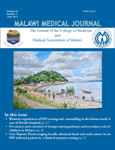
|
Malawi Medical Journal
College of Medicine, University of Malawi and Medical Association of Malawi
ISSN: 1995-7262
Vol. 25, No. 4, 2013, pp. 105-108
|
 Bioline Code: mm13026
Bioline Code: mm13026
Full paper language: English
Document type: Research Article
Document available free of charge
|
|
|
Malawi Medical Journal, Vol. 25, No. 4, 2013, pp. 105-108
| en |
Knowledge and perceptions of quality of obstetric and newborn care of local health providers: a cross-sectional study in three districts in Malawi
Bayley, O.; Colbourn, T.; Nambiar, B.; Costello, A.; Kachale, F.; Meguid, T. & Mwansambo, C.
Abstract
Aim
Quality of service delivery for maternal and newborn health in Malawi is
influenced by human resource shortages and knowledge and care practices
of the existing service providers. We assessed Malawian healthcare
providers’ knowledge of management of routine labour, emergency
obstetric care and emergency newborn care; correlated knowledge
with reported confidence and previous study or training; and measured
perception of the care they provided.
Methods
his study formed part of a large-scale quality of care assessment in
three districts (Kasungu, Lilongwe and Salima) of Malawi. Subjects were
selected purposively by their role as providers of obstetric and newborn
care during routine visits to health facilities by a research assistant. Research
assistants introduced and supervised the self-completed questionnaire by
the service providers. Respondents included 42 nurse midwives, 1 clinical
officer, 4 medical assistants and 5 other staff. Of these, 37 were staff
working in facilities providing Basic Emergency Obstetric Care (BEMoC)
and 15 were from staff working in facilities providing Comprehensive
Emergency Obstetric Care (CEMoC).
Results
Knowledge regarding management of routine labour was good (80%
correct responses), but knowledge of correct monitoring during routine
labour (35% correct) was not in keeping with internationally recognized
good practice. Questions regarding emergency obstetric care were answered
correctly by 70% of respondents with significant variation depending on
clinicians’ place of work. Knowledge of emergency newborn care was
poor across all groups surveyed with 58% correct responses and high rates
of potentially life-threatening responses from BEmOC facilities. Reported
confidence and training had little impact on levels of knowledge. Staff in
general reported perception of poor quality of care.
Conclusion
Serious deficiencies in providers’ knowledge regarding monitoring during
routine labour and management of emergency newborn care were
documented. These may contribute to maternal and neonatal deaths in
Malawi. The knowledge gap cannot be overcome by simply providing
more training.
|
| |
© Copyright 2013 - Malawi Medical Journal
Alternative site location: http://revista.uft.edu.br/index.php/jbb/index
|
|
